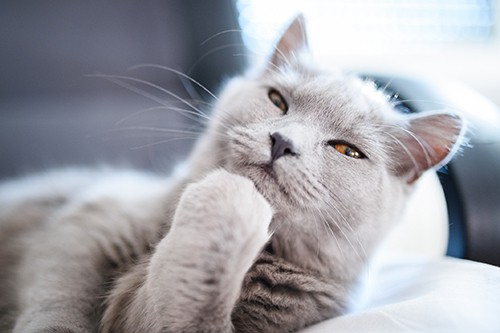Caring for Senior and Geriatric Cats
Cats seem to age more gracefully than dogs, but even they need the same diligent care that we give our canine companions. It is often difficult to notice signs of distress in cats. Cats are masters of hiding illness and pain. Because of this, it is imperative that you bring your cat to the vet for regular visits—especially for seniors, and even more so for geriatric cats.
As cats age they can begin to have issues like hyperthyroidism, renal insufficiency (and then renal disease), and joint pain/arthritis. There are other diseases like cancer, heart disease, and feline diabetes that can show up later in life as well. The most common thing we see is dental disease in cats. Dental disease can seriously impact your cat’s quality of life, so make sure you schedule regular dental cleanings.
Veterinary Options for Senior Cats

While not every cat will develop a disease as they age, the potential is always there. At Hill Country Animal Hospital, we like to screen cats more thoroughly as they start to get older. By performing an expanded blood panel, we can see inside their organs and look for thyroid disease, kidney disease, and diabetes. Ultrasounds and echocardiograms allow us to look at their major organs and watch their heart work to screen for diseases and make a diagnosis if needed.
Cat health is so often overlooked because they commonly stay indoors and don’t come into regular contact with anyone but family members. For that reason, some owners don’t remember to schedule regular checkups. Plus getting your cat to the vet is STRESSFUL! If your cat is stressed by coming to the vet, call us so we can prescribe some medication that will relieve some of the anxiety.
Tips for Senior Cat Care At Home

Your cat’s lifestyle may change as he gets older, and this may include daily medication. If this happens, you have a few options for administering medication. Often, medication can be compounded into liquid or flavored chews. If this doesn’t work, you can place your cat’s pill in an empty gelatin capsule and drop it in his food. Empty gelatin capsules mask the taste and the smell of the pill, which makes it easier to administer.
If your cat is having mobility issues, try getting a lower or shorter litter box. Sometimes the tall, covered boxes become difficult for an older, wobbly cat to navigate. Make sure that your older cat can get to food and water with ease as well.
Some cats need extra warmth and cushion as they age, so keep that in mind as your cat gets older. Your cat may need his own version of a step stool to reach his favorite places as he ages as well.
If your cat needs subcutaneous fluids, we can show you how to do it, and many of us have helpful tips and tricks to simplify the process. Here is a video that demonstrates how to prepare and give subcutaneous fluids.
If your cat develops diabetes, we will walk you through everything you need to know to care for your cat at home. In the meantime, you can watch this video on how to prepare insulin and give injections.
Do’s and Don’ts for Senior Cat Care

- Do watch all of your cat’s habits. Make sure if you see your cat’s behavior change that you monitor and record it, and then consult your veterinarian if the change in behavior continues.
- Don’t chalk changes up to “he’s just slowing down.” Slowing down is often an indication of pain or discomfort. Arthritis or degenerative joint disease could be the issue, so consult your vet. Remember that cats hide pain well.
- Do pay attention to weight loss. Did you know that it can be dangerous for cats to lose too much weight all at once? Changes in weight usually are an indication that all is not well. If you notice rapid weight loss or gain, consult your veterinarian.
- Do pay attention to your cat’s eating and drinking habits. If you notice sustained changes, call your veterinarian.
- Do pay attention to your cat’s elimination habits. Let us know if you see changes.
Be there for your cat as he ages so that you can enjoy his golden years with him. We want to help your cat be a happy, healthy senior kitty! If you need to schedule an appointment for your senior cat, please call us today!
Accreditations:
Wellness Care
From Our Blog:
Librela Can Put the Pep Back in Your Dog’s Step
In the world of veterinary medicine, the pursuit of effective and compassionate treatments for common ailments in our beloved pets is an ongoing journey. Enter Librela, a groundbreaking solution offering hope and relief for dogs grappling with the pain of osteoarthritis (OA). In this blog post, we’ll explore what Librela is, how it works, its […]
Read MoreExams are Important for Your Pet
There are many reasons why exams are important for your pet. Exams are one of the main tools we use to obtain information about your pet’s health. Here are a few of the reasons why exams are a must: What are the different types of exams? There are several different types of exams that your […]
Read More

